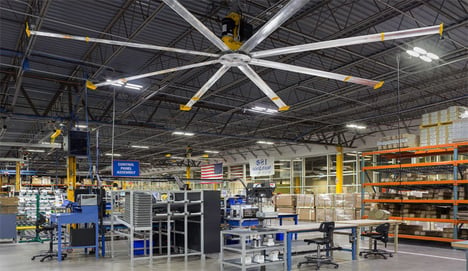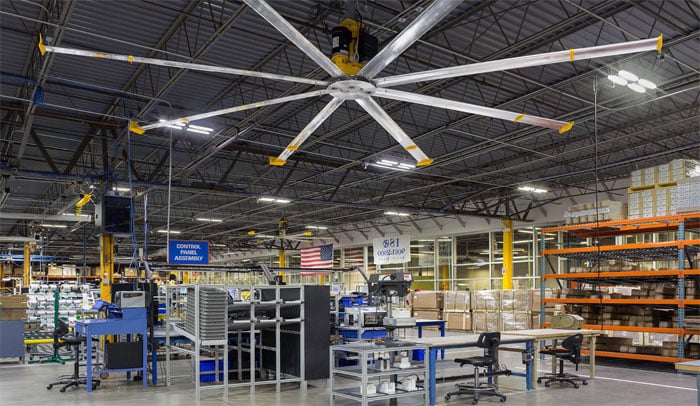A company with a funny name. A dispute about intellectual property. Concerns about cost and privacy. Add it up and what do you get? The latest Proteus Discovery Group case law study.
Background of the Case
Big Ass Fans (BAF) sought to recover compensatory and punitive damages for David Williams, the former highest-ranking officer at BAF’s Singapore subsidiary from January of 2015 to March of 2017.
Upon leaving BAF, Williams incorporated/organized two companies, Vortikul, Ltd. and DAFYDD & Yong Pt. Ltd., recruited two BAF employees to provide sales support for DAFYDD & Yong Pt. Ltd., and advertised fans that looked like copies of BAF fans during his non-compete period with BAF.
BAF asserts twelve claims against the defendants and claims Williams’s actions violated his fiduciary and contractual duties. After limited discovery that included a deposition of Williams, interrogatories, and a request for production, Williams and Vortikul objected to some of BAF’s discovery requests, specifically, web pages, advertisements, and any related promotional material that was used to sell non-BAF fans. Williams and Vortikul claim they have produced all relevant information and further production of this type of information would disclose information that is highly personal, confidential, and not proportionate to the needs of the case.

“The ESI At Issue”
To overcome the Defendants’ unwillingness to produce any more relevant information, BAF proposed a limited third-party forensic inspection of the Defendants’ electronic devices. BAF’s forensic inspection process would be as follows:
- An independent forensic examiner, either agreed upon by the parties or appointed by the Court, would examine the devices
- The devices would be searched for specific terms designed solely to obtain communications between Defendants and former BAF-Singapore employees and between Defendants and commercial parties involved in the fan business
- The examiner would provide the results of the search to Defendants’ counsel to review for privilege and assert legitimate objections with any objected-to communications presented to the Court for an in camera inspection.
Applicable Law
The Court first addresses the scope of BAF’s forensic imaging request by applying these cases:
- Genworth Financial Wealth Management, Inc. v. McMullan, 267 F.R.D. 443 (D. Conn. 2010)
- Bennett v. Martin, 186 Ohio App. 3d 412, 2009 Ohio 6195, 928 N.E.2d 763 (Ohio Ct. App. 2009)
- The Antioch Co. v. Scrapbook Borders, Inc., 210 F.R.D. 645 (D. Minn. 2002)
Glenworth, 267 F.R.D. 433, states the Court must find a sufficient nexus between the claims and need for computer [forensic] imaging and Bennett, 928 N.E.2d 763, sets forth a comprehensive protocol parties must follow to protect privileged information. The Court found that BAF’s proposed limited third-party inspection was similar to the protocols used in Glenworth and Bennett and prevented the inadvertent production of privileged documents.
The Court then addresses the financial expense and burden of the forensic image search by applying the Fed. R. Civ. P. Rule 26(b)(1) and Singler v. Conagra Foods, Inc., Case No. 1:18-cv-271 (S.D. Ohio Dec. 2, 2020).
Rule 26(b)(1) of the Fed. R. Civ. P. states that unless otherwise limited by court order, the scope of discovery is as follows: Parties may obtain discovery regarding any nonprivileged matter that is relevant to any party's claim or defense and proportional to the needs of the case, considering the importance of the issues at stake in the action, the amount in controversy, the parties’ relative access to relevant information, the parties’ resources, the importance of the discovery in resolving the issues, and whether the burden or expense of the proposed discovery outweighs its likely benefit.
Information within this scope of discovery need not be admissible in evidence to be discoverable. Additionally, in Singler, Case No. 1:18-cv-271, a lack of a plausible explanation as to why the burden of the forensic image search exceeds its benefit is not a valid defense. The Court took into consideration the scope of BAF’s proposed forensic image search and the fact that BAF was financing the costs of this search to conclude that the financial expense and burden of the proposed forensic image search did not outweigh its likely benefit.
The Court lastly addresses the Defendants’ incomplete production of relevant information and their privacy concerns by applying Fed. R. Civ. P. Rule 26, Bennett, 928 N.E.2d at 774, and Ameriwood Industries, Inc. v. Liberman, No. 4:06CV524-DJS (E.D. Mo. Feb. 23, 2007).
Rule 26 directs that a party may obtain discovery regarding any nonprivileged matter that is relevant to any party's claim or defense. Bennett states that “courts must consider the significant interests implicated by forensic imaging before ordering such procedures,” and Ameriwood says that generic evocations of privacy, without more, fall short of showing that the proposed forensic imaging would be unduly burdensome. The Court recognized the privacy concerns regarding a search such as this but found that the proposed three-step forensic image search satisfied the interests of the parties.
What It Means / Why It Matters
Forensic imaging requests in litigation require a party to draw a nexus between the claims and need, address financial expenses, and protect against concerns of privacy.
Requesting forensic imaging of opposing-party custodian devices after less invasive and burdensome methods of discovery requires planning, strategy, and experts who will help you navigate the digital forensics process.



